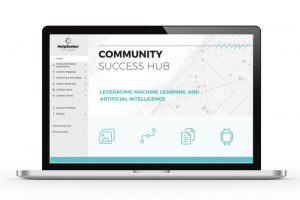A Canadian tech company is using artificial intelligence and machine learning tools as a support for social sector organizations to meet our very real and seemingly ever-increasing social needs.
Although greatly magnified by the current pandemic, the need to deliver social services has long been with us.
And while services and solutions for social needs, such as affordable housing, safe shelters, food support; mental health, wellness and counselling services; recreation, parenting, education and training resources; addiction treatment or the prevention of domestic violence and more, do exist, it is clear that awareness, access and availability must be increased.
So Calgary, AB-based HelpSeeker Technologies is developing digital tools and mobile apps that support social service delivery by organizing searchable directories of social service resources and providers, and by analyzing data that describes best practices and outcomes in social service delivery and community support activities.
The social technology and innovation B-Corp is now going to receive $2.5 million in federal funding to develop its service searching app and companion online platform.
The HelpSeeker app lets people browse and search through a growing network of location-based social services, resources and support agencies. Literally thousands of community, provincial and federal social assistance programs exist, but matching the most appropriate and effective solution for unique needs at the local level can be a challenge. The company says more than 250,000 diverse social services are available.
So sorting through them can be a challenge. But another obstacle to getting the right service is the lack, in some cases and from some communities, of solid data-based foundational knowledge and insight about a people’s actual needs and a provider’s appropriate response. Immigrant, Indigenous and First Nations communities, for example.
Reliable data and analysis can give social service providers a real understanding of the resources such communities need. But without that solid knowledge and appropriate response, it’s much more than a risk that important factors in decision-making will be missed and inequitable access to social support will continue.
It’s inevitable.
So along with the HelpSeeker app, the company has introduced its new social decision support platform, called Community Success Hub. The online tool incorporates AI (artificial intelligence) and ML (machine learning) capabilities to collect, manage and analyze hundreds of social data points that describe service needs, trends, comparisons, in-depth analysis and other actionable insights, as company co-founder Dr. Alina Turner explains.
“Our goal is to shorten the time between data collection and analysis and what matters most: action. The technology now available can give us unprecedented insights in the blink of an eye, versus years of research while those in need continue to struggle,” Turner describes, noting that the platform also generates suggestions and solutions to shorten the time from research to action, and at a price point significantly lower than traditional needs assessments.
The tool can run sophisticated simulations so communities can better understand how social issues are changing, and how they can get help and stay ahead of rising homelessness, suicide or domestic violence. Community Success Hub users can also compare their region with other communities to gain insights on key demographics, service requirements, and possible system changes or, in fact, whole new programs that are needed to respond to local dynamics and changing social needs.
“It’s all about democratizing data and making it useful for day-to-day decision making. Our goal in developing this technology was to disrupt the traditional way of running social needs assessments that is very costly and time-consuming,” adds Dr. Matt Parker, EVP Innovation at HelpSeeker.
With a focus on accelerating the digital transformation of our so-called social safety net to ensure the best and most equitable outcomes for all involved, HelpSeeker’s Community Services Hubs can be used to turn sometimes hard-to-digest data synthesis results into more recognizable visualizations that deliver key insights into what makes for equitable well-being in the community.
HelpSeeker reports it is currently serving more than 200 municipalities (mostly in Western Canada but also in the Greater Toronto Area) as it seeks to connect Canadians with local agencies that can provide the social support they need. For most support organizations, sign-up is free (although a paid premium listing is available).
The digital tools provide location-based search for people looking for social help, and there are several filters available to help them find the most relevant service. There is no sign-up required for users.
Launched in 2018, HelpSeeker used investment and support from Canada’s Digital Technology Supercluster to develop the underlying AI/ML algorithms that could predict homelessness, suicide and domestic violence on a community-by-community basis. Using those algorithms, the company says it can model different societal and economic scenarios, community needs and municipality capabilities in order to better understand how changes in our society affect the delivery of the social safety net – if not the resiliency of the fabric from which it is made.
It is recognized, for example, that Indigenous communities and services are often left out of key datasets, creating barriers for individual community members in getting help and accessing the social safety net, while at the same time limiting society’s overall understanding of the resources Indigenous communities need.
In a webinar scheduled for this coming June 17, called On the Map: Supporting Indigenous Self-Representation & Ownership in Systems Mapping, HelpSeeker will host a discussion about why building access to information and understanding community needs is an essential part of supporting Indigenous communities, and how its technology can contribute to such efforts.
Its technology and algorithms are now part of HelpSeeker’s Community Success Hub, and the company has received funding support from Canada Mortgage and Housing Corporation to scale up from the current 200 served communities to over 5,000 nationally.
It was the Minister Responsible for the Canada Mortgage and Housing Corporation (CMHC), Ahmed Hussen, who recently announced $2.5 million in funding over three years to support HelpSeeker and the development of its digital application to match Canadians in need with essential social services and supports in their local community.
The HelpSeeker service navigation app is available at the Google Play Store or Apple App Store; the online directory of social services can be found at HelpSeeker.org.

Laptop displaying HelpSeeker Technologies’ latest innovation: Canada’s first digital decision support system for the social sector – the Community Success Hub. (CNW Group/HelpSeeker Inc)
-30-



